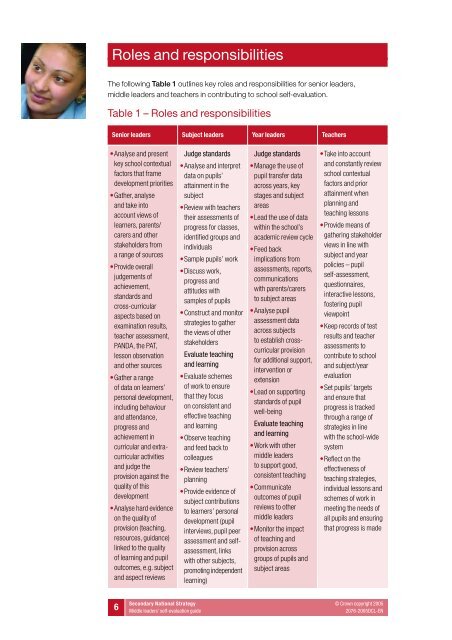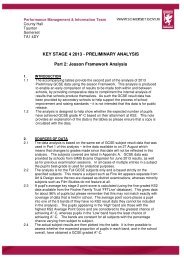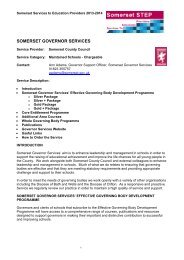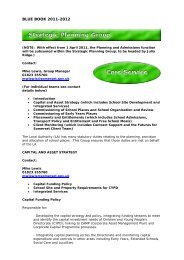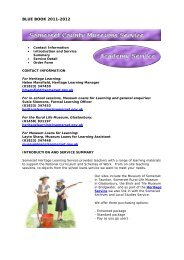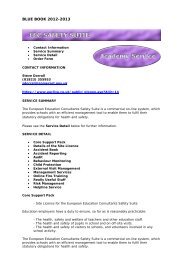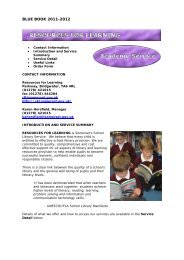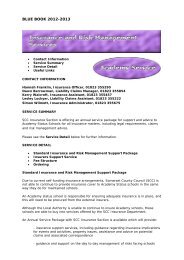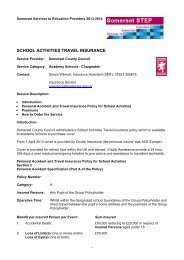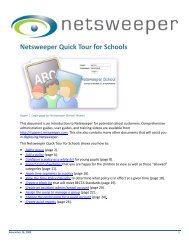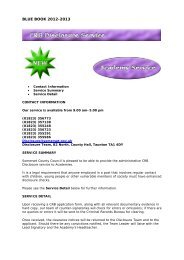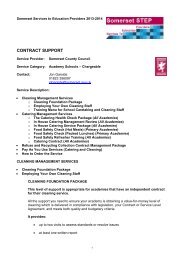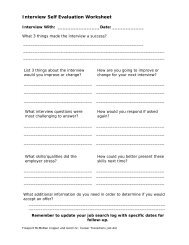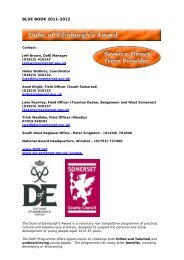Middle leaders' self-evaluation guide
Middle leaders' self-evaluation guide
Middle leaders' self-evaluation guide
Create successful ePaper yourself
Turn your PDF publications into a flip-book with our unique Google optimized e-Paper software.
Roles and responsibilities<br />
The following Table 1 outlines key roles and responsibilities for senior leaders,<br />
middle leaders and teachers in contributing to school <strong>self</strong>-<strong>evaluation</strong>.<br />
Table 1 – Roles and responsibilities<br />
Senior leaders Subject leaders Year leaders Teachers<br />
•Analyse and present<br />
key school contextual<br />
factors that frame<br />
development priorities<br />
•Gather, analyse<br />
and take into<br />
account views of<br />
learners, parents/<br />
carers and other<br />
stakeholders from<br />
a range of sources<br />
•Provide overall<br />
judgements of<br />
achievement,<br />
standards and<br />
cross-curricular<br />
aspects based on<br />
examination results,<br />
teacher assessment,<br />
PANDA, the PAT,<br />
lesson observation<br />
and other sources<br />
•Gather a range<br />
of data on learners’<br />
personal development,<br />
including behaviour<br />
and attendance,<br />
progress and<br />
achievement in<br />
curricular and extracurricular<br />
activities<br />
and judge the<br />
provision against the<br />
quality of this<br />
development<br />
•Analyse hard evidence<br />
on the quality of<br />
provision (teaching,<br />
resources, guidance)<br />
linked to the quality<br />
of learning and pupil<br />
outcomes, e.g. subject<br />
and aspect reviews<br />
6<br />
Judge standards<br />
•Analyse and interpret<br />
data on pupils’<br />
attainment in the<br />
subject<br />
•Review with teachers<br />
their assessments of<br />
progress for classes,<br />
identified groups and<br />
individuals<br />
•Sample pupils’ work<br />
•Discuss work,<br />
progress and<br />
attitudes with<br />
samples of pupils<br />
•Construct and monitor<br />
strategies to gather<br />
the views of other<br />
stakeholders<br />
Evaluate teaching<br />
and learning<br />
•Evaluate schemes<br />
of work to ensure<br />
that they focus<br />
on consistent and<br />
effective teaching<br />
and learning<br />
•Observe teaching<br />
and feed back to<br />
colleagues<br />
•Review teachers’<br />
planning<br />
•Provide evidence of<br />
subject contributions<br />
to learners’ personal<br />
development (pupil<br />
interviews, pupil peer<br />
assessment and <strong>self</strong>assessment,<br />
links<br />
with other subjects,<br />
promoting independent<br />
learning)<br />
Judge standards<br />
•Manage the use of<br />
pupil transfer data<br />
across years, key<br />
stages and subject<br />
areas<br />
•Lead the use of data<br />
within the school’s<br />
academic review cycle<br />
•Feed back<br />
implications from<br />
assessments, reports,<br />
communications<br />
with parents/carers<br />
to subject areas<br />
•Analyse pupil<br />
assessment data<br />
across subjects<br />
to establish crosscurricular<br />
provision<br />
for additional support,<br />
intervention or<br />
extension<br />
•Lead on supporting<br />
standards of pupil<br />
well-being<br />
Evaluate teaching<br />
and learning<br />
•Work with other<br />
middle leaders<br />
to support good,<br />
consistent teaching<br />
•Communicate<br />
outcomes of pupil<br />
reviews to other<br />
middle leaders<br />
•Monitor the impact<br />
of teaching and<br />
provision across<br />
groups of pupils and<br />
subject areas<br />
•Take into account<br />
and constantly review<br />
school contextual<br />
factors and prior<br />
attainment when<br />
planning and<br />
teaching lessons<br />
•Provide means of<br />
gathering stakeholder<br />
views in line with<br />
subject and year<br />
policies – pupil<br />
<strong>self</strong>-assessment,<br />
questionnaires,<br />
interactive lessons,<br />
fostering pupil<br />
viewpoint<br />
•Keep records of test<br />
results and teacher<br />
assessments to<br />
contribute to school<br />
and subject/year<br />
<strong>evaluation</strong><br />
•Set pupils’ targets<br />
and ensure that<br />
progress is tracked<br />
through a range of<br />
strategies in line<br />
with the school-wide<br />
system<br />
•Reflect on the<br />
effectiveness of<br />
teaching strategies,<br />
individual lessons and<br />
schemes of work in<br />
meeting the needs of<br />
all pupils and ensuring<br />
that progress is made<br />
Secondary National Strategy © Crown copyright 2005<br />
<strong>Middle</strong> leaders’ <strong>self</strong>-<strong>evaluation</strong> <strong>guide</strong> 2076-2005DCL-EN


